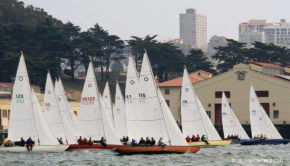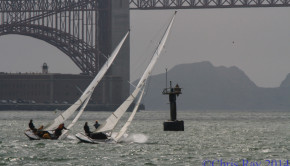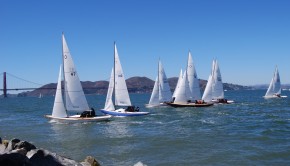Much more to the regatta than racing
Published on August 26th, 2024
The most competitive Norwegian and Danish Knarr sailors will soon arrive at St. Francis Yacht Club to join the local San Francisco fleet for the 54th edition of the International Knarr Championships (IKC) on September 1-7 in San Francisco, CA. Much more than just a sailing event, the IKC places a premium on two elements: rock solid friendships and world-class one design racing in a classic boat.
The inaugural IKC was held in San Francisco in 1969, initiated by Danish-American sailor Knud Wibroe who introduced the Knarr to the Bay. The ethos of the Knarr class are based in tradition and camaraderie bound together by a Corinthian desire to play hard and have as much fun as humanly possible both on and off the water. The 30-foot Knarr was first built in Norway in 1946 and still attracts competitive sailors today.
“The class is all about friendship between three countries and that makes it different to conventional competitive sailing,” said John Buestad of the San Francisco Knarr fleet. “The same good guys compete at IKC every year from the three countries and it turns out to be pretty special.
“Given that the boats are old and slow you wouldn’t think it would be that competitive, but it always has been—and certainly is now in our local fleet with Olympians Russ Silvestri and Randy Hecht.
“Don Jesberg, who is an accomplished Etchells sailor and won the season championship last year, is racing with Ethan Doyle. Then there are the Perkins brothers who won the IKC in Norway last year. We have World and National Champions in this fleet. You have not just good sailors but great sailors coming in for the IKC.”
The IKC rotates annually between Denmark, Norway, and the United States, and is unique in that competitors draw for the boat that they will sail on any given race day. International competitors are always hosted by home fleet members, and it is entirely expected that sailors fully participate in singing and theatrical performance when appropriate.
As Buestad notes, the San Francisco home fleet is stacked with talent, both seasoned and newcomer, drawn to the Knarr because of the skill required to sail the boat. As an older, heavier design, its race prowess may not be obvious to the 20- or 30-year-old inclined toward fast modern boats but therein lies the Knarr allure.
“The Knarr is a lot slower but that means the fleet goes almost the same speed, so it becomes all tactical,” Buestad said. “You have to have a great driver, but you really need a great tactician to figure out the current and tide, otherwise you can be the fastest sailor in the world and you won’t do well. It takes a while to learn to drive a Knarr, and the starts are critical. To finish in the top five, you must have a decent start.”
In recent years, the class has become an attractive proposition for younger competitors from other classes, who see some of the top sailors on San Francisco Bay racing Knarrs. They want to compete against the best sailors, but they soon figure out it’s not so easy sailing a Knarr, says Terry Anderlini, a Knarr owner since 1968.
“The funny thing is that it might look real simple to these hot shots who sit there and say, ‘Main and jib and old guys are sailing these boats, I am sure we can jump in there and win some races.’ Then they get their lunch handed to them! It’s just not that easy.”
Chris Perkins is doing his part to bring younger players into the Knarr family. In this IKC, he will be racing with his two sons, 23-year-old Charlie and 21-year-old Johnny, and against his brother, Jon, who is the defending IKC champion.
Chris Perkins was indoctrinated into the Knarr as a teen and has won the IKC four times, mostly on his home turf on San Francisco Bay, though he broke a Danish winning streak that ran from 1981 to 1991 by winning his first IKC in Denmark in 1992.
“Having my two sons sail with me in the fleet is a great time. They absolutely love it and we’ll have fun mixing up the team with all Perkins!”
He adds, “When you win a race in this fleet, everyone around you is really excited and supportive as they know what it takes—you have to sail really well and you have to get a little lucky. Your boat draw has to be good, as you don’t want to draw any slow boats. So, if you win, your competition is the first to congratulate you and buy you drinks — very different than winning in other fleets where the runners-up aren’t so happy.”
Mark Dahm, the 2024 IKC Chair, said that fun is built into the program, “It’s ten races over seven days so keeping up with the racing is one thing, but keeping up with the social schedule is another. It’s almost more demanding in preparation than the racing. It takes a lot of effort by a handful of people, but the festivities are on track to be epic, like the Thursday night Country-Western party featuring Mitch Polzak and the Royal Deuces.”
Twenty-five teams will be heading for the start line in front of St. Francis Yacht Club for the first race on September 1, with racing held daily to determine the overall champion.
Details: https://www.theclubspot.com/regatta/T4afdxXYf5
Source: StFYC








 We’ll keep your information safe.
We’ll keep your information safe.